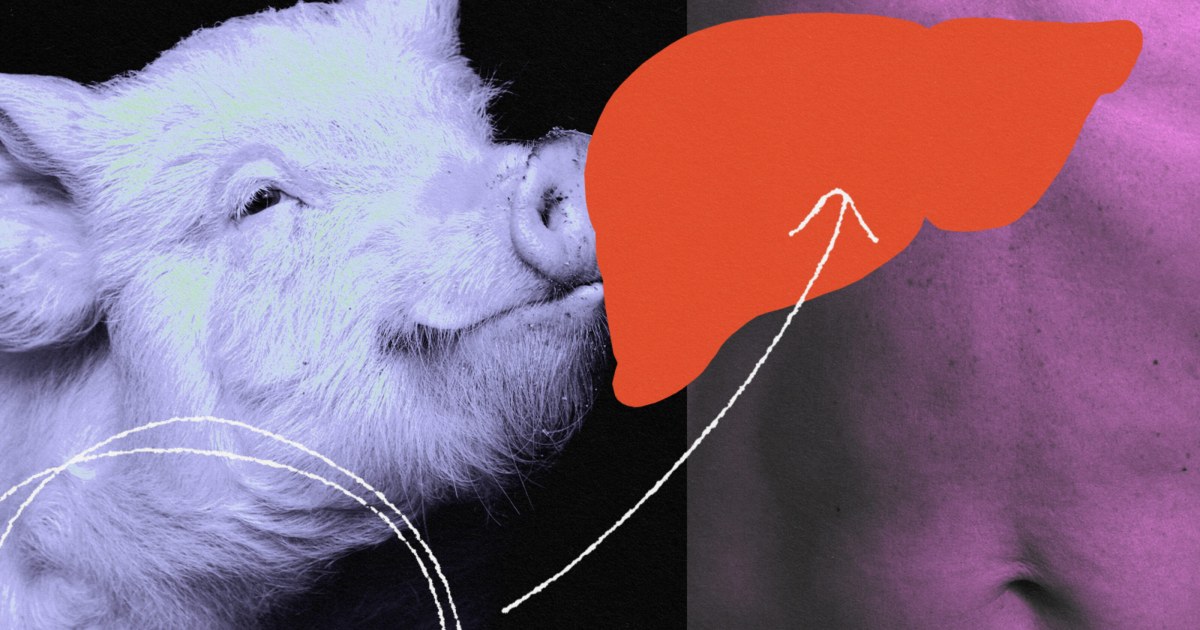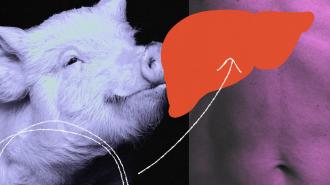
Pig liver filters blood outside a person’s body for 72 hours
A gene-edited pig liver that filtered the blood of a person who was brain dead for 72 hours could one day help people with liver failure.
Pig liver filters blood outside a person’s body for 72 hours
The CRISPR’d organs could potentially keep people alive while they wait for liver transplants.
Adobe Stock / Freethink / Jacob Hege
By Kristin Houser
January 23, 2024
Fields
CRISPR
MEDICINE
Agenetically modified pig liver filtered the blood of a person who was brain dead for 72 hours — suggesting that these organs could one day keep people experiencing liver failure alive while they wait for a human transplant.
The challenge: If your kidneys fail, a dialysis machine can filter your blood until the organs heal or you find a donor for a transplant. If you’re experiencing heart or lung failure, an ECMO machine can keep you alive for some time by oxygenating and cleaning your blood.
There’s no such device for people dealing with liver failure, though. They just have to hope they heal or find a donor liver before their organ stops working completely — and because the need for donor livers exceeds the supply, 1,700 people in the US die while waiting for one every year.
“Over three days, the pig liver was functioning outside the body and looked pretty good.”
ABRAHAM SHAKED
What’s new? On January 18, Penn Medicine researchers reported that a pig liver attached to the body of a person who was brain dead and on life-support was able to filter their blood for 72 hours — suggesting that these organs could one day buy patients with liver failure extra time.
“It was amazing to me to see the system working,” study leader Abraham Shaked told TIME. “The brain-dead patient was exceptionally stable, and we were very surprised to see that over three days, the pig liver was functioning outside the body and looked pretty good.”
The details: The pig liver used for the study was provided by eGenesis, a biotech company developing genetically modified pig organs for transplant into people. The pig it came from had undergone 69 genetic edits with CRISPR to make its organs more compatible with humans and less likely to be rejected after a transplant.
The Penn team connected the pig liver to a device developed by medical tech company OrganOx. It’s designed to keep donor livers warm and supply them with blood, nutrients, and oxygen, ensuring they stay healthy until they can be transplanted.
“Any time a patient dies while waiting for a transplant, it is a tragedy.”
ABRAHAM SHAKED
Once the pig liver was in place, the Penn researchers ran a tube from one of their patient’s veins to the machine so that their blood could be pumped through the organ. Another tube transported the filtered blood back into the patient through another vein.
The patient’s own liver was left in place for the study, which was predetermined to end after 72 hours.
Looking ahead: This isn’t the first time researchers have tried to use pig livers as external blood-filtering machines — scientists at Duke University tested the approach in people with liver failure as early as the 1990s, but the pig organs always failed within 5 hours.
The fact that Penn’s pig liver still looked healthy after 72 hours is encouraging, but the team won’t know whether it could potentially help people with liver failure until the next stage of their study.
“The success of the first part of our study is significant for those facing liver failure.”
ABRAHAM SHAKED
That’s when they plan to test the system in three more people who have been declared brain dead, and who have had their own livers removed. If the system works, they hope to launch a trial in people with liver failure, hopefully buying them more time to recover or find a donor liver.
“Any time a patient dies while waiting for a transplant, it is a tragedy, and we are always working to develop new ways to extend their lives,” said Shaked.
“The success of the first part of our study is significant for those facing liver failure, offering a glimpse into a future where innovative solutions can bring hope to patients who might otherwise be destined to die while waiting for a transplant,” he continued.
We’d love to hear from you! If you have a comment about this article or if you have a tip for a future Freethink story, please email us at tips@freethink.com.

